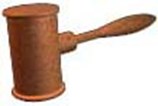Customer sues Home Depot for injuries caused by trip and fall over forklift pallet

On Feb. 18, 1997 Jacqueline Michalski, a New York State resident, tripped and fell over a pallet resting on the forks of a forklift truck at the Home Depot store in Schenectady, NY. She claimed serious injuries from the fall.
Home Depot's popularity stemmed in part from the "hands-on" feeling of shopping in a working warehouse environment, with goods displayed on shelves and racks that in some places reached up to 20 feet above the floor. In keeping with the idea that the store was a working warehouse, the practice at Home Depot was for a forklift operator to leave the forklift wherever it happened to be when the employee had finished using it, parked to one side in the same aisles down which customers walked. A pallet left on one of these parked forklifts was allegedly the culprit in the accident that involved Michalski.
Michalski entered the Home Depot intent on purchasing bathroom cabinets. A store employee directed her toward the appropriate aisle. Michalski turned left into the aisle indicated, and noticed the cabinets she sought above eye-level on the left side of the aisle. As she proceeded down the aisle, she walked by the parked forklift on her right. The back of the forklift -- the side without the forks -- faced her as she entered the aisle and as she walked past it. The forklift was eight to 10 feet tall, and five or six feet wide.
Sitting on the forks side of the forklift away from Michalski was a brown pallet at floor level. The pallet was four feet wide, four feet long, and four inches high. As Michalski looked up at the cabinets she planned to purchase, she stepped back for a better view, and in so doing tripped over the pallet and fell.
Michalski filed a lawsuit against Home Depot claiming that Home Depot was negligent in creating a dangerous and hazardous condition and in failing to warn persons lawfully on the premises of the hazardous condition.
Her case went to the U.S. District Court For The Northern District Of New York, which threw her case out because the court said the presence of the forklift was open and obvious to a passerby and therefore Home Depot could not be liable according to New York law.
Michalski appealed to the U.S. Court Of Appeals for the Second Circuit, which overturned the district court ruling. According to the appeals court, a company such as Home Depot was not relieved from responsibility in New York where harm from an open and obvious hazard was readily foreseeable by the company and the company had reason to know its customers might not expect or be distracted from observing the hazard.
As a result, the appeals court sent Michalski's case back to the district court so that her case could go forward on the merits of her claim.
Source: Michalski v. Home Depot Inc., 2000 U.S. App. LEXIS 21127 (U.S Court Of Appeals for the Second Circuit) (Aug. 21, 2000).
Published as an ongoing series by VerticalNet, Inc. and Ornel, Inc©. Ornel Inc., (www.ornel.com) producers of CourtCases.net (www.courtcases.net).
